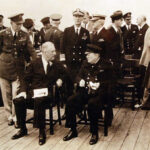
Ever wonder what goes into the President’s Daily Brief (PDB)? It’s not your average morning news. Stephanie Sellers, a former PDB briefer, is currently the Central Intelligence Agency (CIA) Representative to the U.S. Army War College and the General Walter Bedell Smith Chair of National Intelligence Studies. She joins host Ron Granieri to share her experiences, and describes the job as trying to keep up with “17 different soap operas at once.” This crucial intelligence update is delivered to the president and other senior government leaders, shaping their understanding of critical issues. Sellers, who previously worked on missile systems for the Navy, joined the CIA after 9/11 out of a desire to continue to serve her country and to use and grow her technical and leadership skills in new and exciting assignments. Her journey to becoming a PDB briefer was fueled by a desire for challenge and the opportunity to work at “the nexus of intelligence and policy.”
The briefing is the nexus of intelligence and policy.
Podcast: Download
Subscribe: Apple Podcasts | Spotify | Amazon Music | Android | Pandora | iHeartRadio | Blubrry | Podchaser | Podcast Index | TuneIn | Deezer | Youtube Music | RSS | Subscribe to A Better Peace: The War Room Podcast
Stephanie Sellers currently serves as the Central Intelligence Agency (CIA) Representative to the U.S. Army War College and the General Walter Bedell Smith Chair of National Intelligence Studies. She has twenty-seven years of experience in the U.S. Government as an intelligence educator; tradecraft facilitator; analytic manager; military and science and technology analyst; and missile system engineer.
Ron Granieri is Professor of History at the U.S. Army War College and the Editor of A BETTER PEACE.
The views expressed in this presentation are those of the speakers and do not necessarily reflect those of the U.S. Army War College, U.S. Army, or Department of Defense.
Photo Credit: Generated by Gemini





Re: the PDB (or, in this case, the Soviet equivalent): At the end of the Cold War, when the Soviets abandoned certain of their central ideas, values, beliefs and institutions — and adopted certain of the central ideas, values, beliefs and institutions of their enemies instead — at that time, did not the Soviets (a) lose their old sources of human intelligence (to wit: both at home and abroad, those who believed in what the Soviets had previously believed in, and those who stood for what the Soviets had previously stood for, etc.) and, thus, (b) were forced to massively change/adapt their intelligence gathering operations — and their version of the PDB — accordingly?
Likewise, now at the end of the post-Cold War, if the U.S. abandons certain of our own central ideas, values, beliefs and institutions — and adopts certain of the central ideas, beliefs and institutions of our enemies instead — then, in this instance also, will not — the U.S. in this case — (a) lose our old sources of human intelligence (both at home and abroad, those who believe in what the U.S. used to believe in, those who stand for what the U.S. used to stand for, etc.) and — much like our Soviet counterparts above — (b) be forced to massively change/adapt — both our intelligence gathering operations — and our PDB accordingly?
(Much earlier that this, these kinds of “costs” [relative to what kinds of “benefits?”] should have been weighed much more carefully and much more thoroughly?)